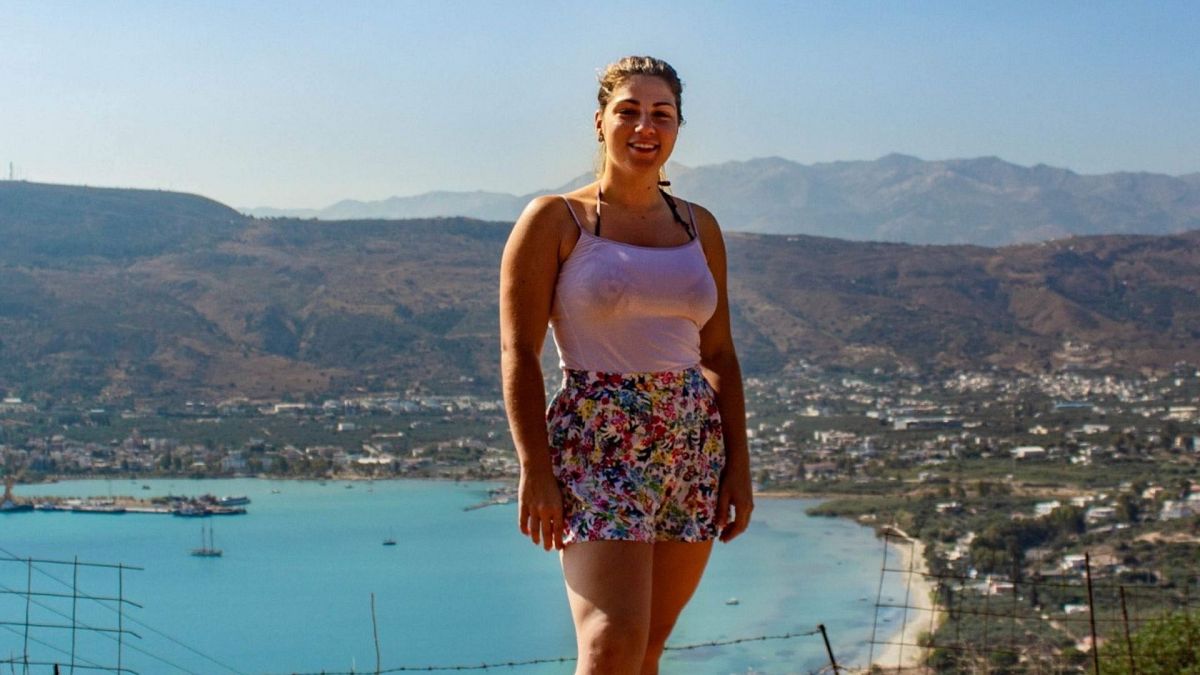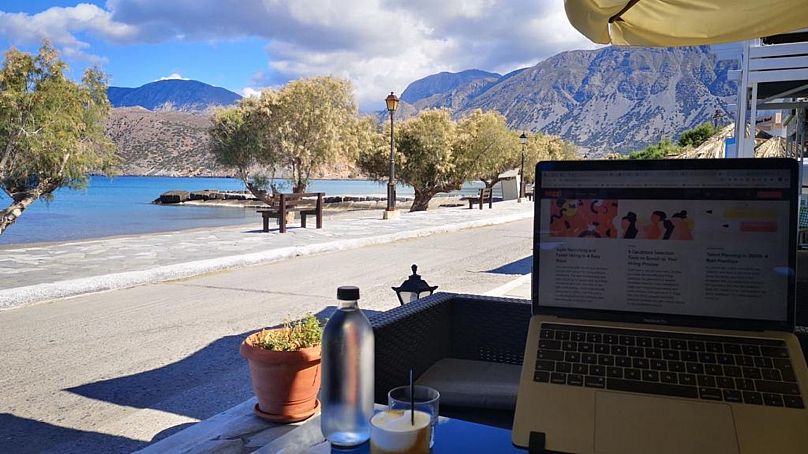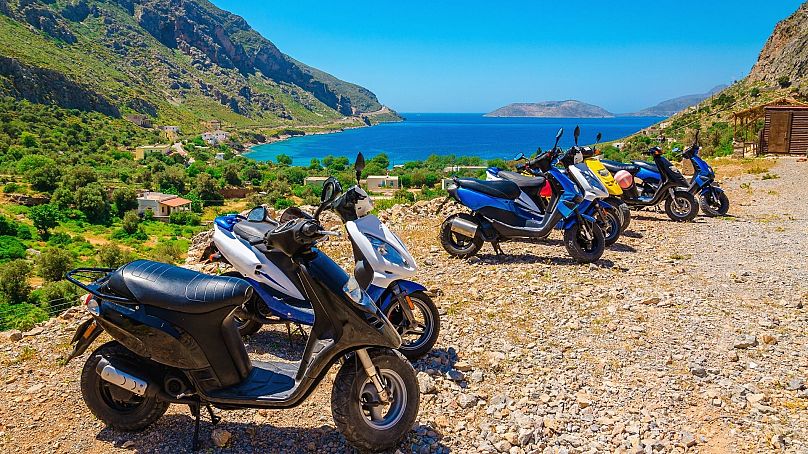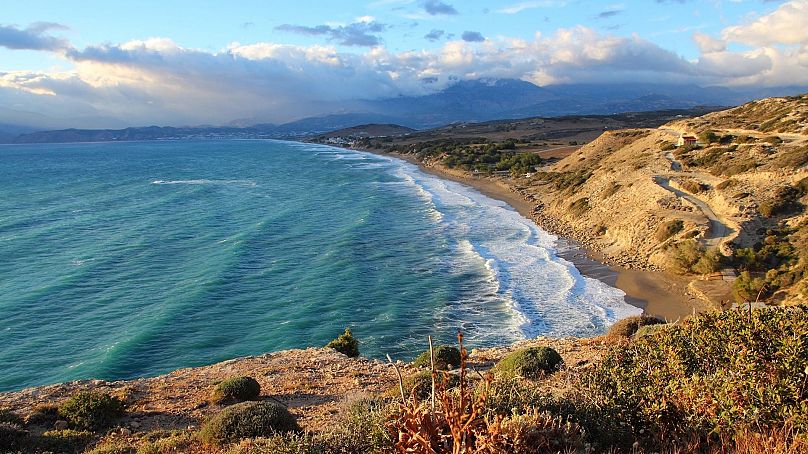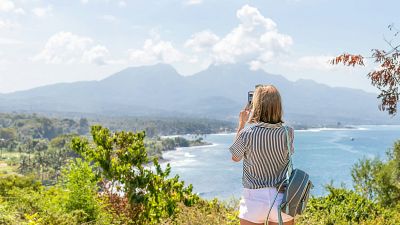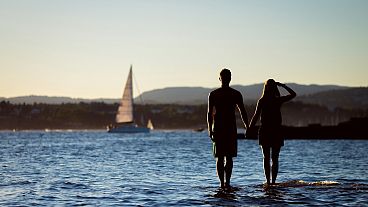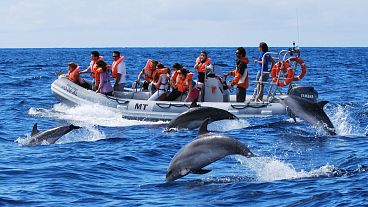I moved to a village on the northeastern coast of Greece's biggest island, Crete, and this is why you should too.
Gazing across the glassy surface of the Mediterranean sea, I stood, insignificant, taking it all in. The sky a violent shade of pink, the early morning air full of possibility, the water lapping lazily at the shoreline.
My view was bookended by craggy mountains that cradled this speck of heaven from the outside world.
I thought back to 16-year-old me, who, having just learnt what a digital nomad was, decided this would be her life. As with any dream, there was a small part of her that didn't believe it would actually happen. But here she was, eight years later, living and breathing it.
Standing on the breakwater at Pacheia Ammos beach became a regular pastime of mine during the six months I spent there. The village, located on the northeastern coast of Greece's biggest island, Crete, is home to just a few hundred residents. And for a short, special pocket of time, I was one of them.
Making a house a home
I arrived in Pacheia Ammos in late July, with a backpack, an open heart, and little else. A friend of a friend had agreed to let me stay with him for as long as I wanted. Having never met the guy, I was surprised by his generosity. I graciously accepted the offer, which in retrospect might not have been extended had he known I'd end up staying until Christmas…
We clicked in no time, discovering shared interests, values and even the same dark humour. Over a few weeks and more than a few beers, we became very close. The irony of the situation - Romeo and Julia under one roof - wasn't lost on us. Before I knew it, this random Greek village started feeling more and more like home.
At the time, I was working for a remote-first company that encouraged us to work from wherever. Living in such an idyllic place - with the beach on my doorstep, and a sea of olive trees and mountains in my backyard - it was easy to feel like I was on a permanent holiday.
As I settled into my new home, my days slowly took on a comfortable amount of predictability, the kind that only comes with commitment to a place and time. I'd tackle my morning emails at home before heading out to my favourite beachfront cafe which doubled as my office.
It was from here I set up ad campaigns, edited blog content, and crafted marketing strategies - try getting stressed while drenched in sunshine with the sound of waves crashing around you. It's very difficult.
Romeo and I would both finish our work days around 4pm. Hazy afternoons bled into breezy summer nights in the company of friends, usually in a neighbouring village.
While it was still warm, we lazed on sandy beaches or drove to the nearby town for sundowners. Later in the year, as the weather turned (yes, it gets cold in the winter!), we'd watch movies or hang out in tavernas where we'd befriend locals with a game of Tavli and a little carafe of raki.
"Are you a local or tourist?"
I asked myself this question frequently. Being a digital nomad is a unique experience, because you belong simultaneously everywhere and nowhere. You are a chameleon who can settle almost anywhere in the world and integrate, to an extent, within the local culture and community.
At times, I felt like a local. I got to know the shopkeeper. I wrestled with the postal service. I memorized the twists and turns of the Cretan roads to the point where I knew our exact location based on the mountain faces we whooshed past.
On the other hand, digital nomads don't have the lived experience of someone who grew up in the place they're visiting. The mannerisms and cultural attitude are dead giveaways that you aren't a local. As a Brit, struggled with some elements of culture shock, which definitely made me feel more tourist than local.
Greeks love asking questions about your life in casual conversation and some were much more personal than I was used to over in the UK.
Greece also still has quite a macho culture, Crete even more so. I never felt unsafe as a woman, but I would experience seemingly patronising comments from older village men, or get the feeling I was being ignored in conversation in favour of other men.
While I felt triumphant every time I navigated from A to B without a map, I'm sure the locals didn't consider me "one of them". I was striving for some sort of validation, coveting the locals' approval and acceptance. But I realised chasing this badge of honour and melting into the sea of Cretans around me, even if it were possible, would come at the cost of my own experience, heritage, and stories - which are valuable and worth sharing.
From this moment, the goal shifted. I was no longer seeking approval, but instead decided to own my position as a digital nomad - an intermediate between us and them - with my own beautiful experiences to share.
This acceptance allowed me to feel true integration of my full self within a new society, and ultimately have a more authentic experience with everyone I met.
What no one tells you about living in a Cretan village
After 6 months in Pacheia Ammos, I picked up a thing or two about the Cretan way of life that you won't read about online.
1. Prepare for questions about your lifestyle
Greeks love asking questions. In my experience, most people didn't know what a digital nomad was (Crete's primary industries are tourism and agriculture), and were very curious to learn more about how I could live life "on the road".
2. Speaking Greek is a huge advantage
This isn't Mykonos or Santorini - lots of people don't speak any English. It isn't uncommon to be hung up on when you're enquiring about something over the phone in English.
3. Get a Greek phone number
Getting a Greek number will save you substantial hassle. If the contact number on any form or delivery is foreign, they will not call it. Trust me, I learnt the hard way.
4. Women are rarely seen out at bars
Greece is still quite a macho culture, so while you'll still see plenty of women out in shops and in society generally, men remain dominant in the village tavernas.
5. It DOES get cold in winter
Since I arrived, there was talk of how cold and miserable it gets in winter - a shocking 15 degrees. Having just spent a winter in Scotland, I scoffed with superiority.
How could that possibly be cold? I was wrong. It was freezing. I was wearing four layers and still cold. So yes, if you're planning on spending a winter on the island, be prepared.
How to move to Crete and be a digital nomad
The digital nomad life is becoming more and more accessible and realistic for people all over the world. If you feel called to explore this lifestyle in Crete, here are some tips for you.
1. Find a place to live
Airbnb or Booking.com will charge you 10x the price you'd pay via the local market. Property opportunities are not listed online, they're rented by word of mouth.
Your best bet to snag a great deal is talking to local taverna owners about anything going. I was sharing a one bedroom place on the beachfront and splitting the rent - which came to €90/month per person. Yep, really.
2. Find a place to work
I love working in coffee shops, so that's what I did. Internet speeds are decent, plus, the Greeks have a strong coffee culture.
It is not uncommon for them to spend up to five hours in a cafe, so no one will kick you out for staying a while. Unfortunately, you'll be hard pressed to find a coworking space in these remote villages.
3. Learn how to get around
A car or scooter is the best option for getting around the island. As I can't drive, I relied on buses and hitchhiking.
The bus system is a hectic experience, but it is reliable and affordable. Always check the KTEL website for the latest bus timetable, as it changes through the seasons.
4. Make friends
Every taverna, coffee shop, beach, and bakery is a chance to meet someone new, just by striking up conversation.
More often than not, people will be happy to engage with you.There are also several expat Facebook groups that are very friendly and a nice way to ease yourself into the Cretan community.
5. Enjoy yourself!
Embrace the chaos, embrace every experience, and embrace yourself.
Adjusting can be tricky - but it pays off
Moving to a place like Pacheia Ammos can be challenging. There are a lot of new experiences to navigate - a language barrier, cultural differences, adjusting to village life.
Getting under the skin of a place takes time, but that hard work pays off with the most rewarding feeling.
One day, people start greeting you on the street. The barista knows your coffee order by heart.
You start recognising where you are, based on mountain faces alone. And that - the art of making a foreign land a home - may be the greatest adventure of all.
